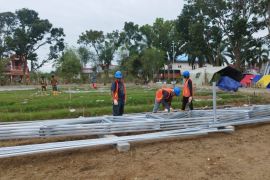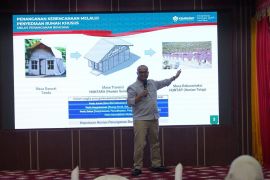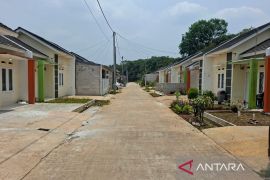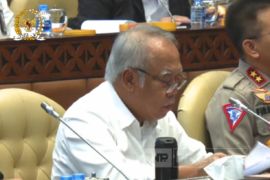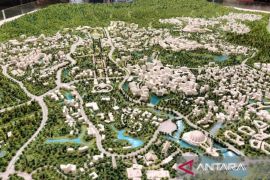Coinciding with the National Labor Day, the launch will be held in Ungaran, Semarang District, Central Java Province, which will be simultaneously followed by 17 provinces that are ready to support the program.
President Jokowi has, in fact, set an ambitious target of building 10 million houses for low-income people by 2019, or two million houses annually.
The government will start working on reducing a backlog of some 13.5 million housing units this year by implementing the program.
Public Works and Public Housing Minister Basuki Hadimuljono has said the One Million Houses Program is part of Nawacita, or the nine priorities of the Jokowi administration.
To support the program, every stakeholder must first understand the significance of a house adds to ones dignity, he stated.
The government allocates Rp 10 trillion of the 2015 revised state budget draft to realize the program.
The allocated state budget will not only be used to construct houses, but also to fund the Housing Loan Liquidity Facility (FLPP), government-backed mortgages which was set up in 2010 to help low-income people acquire housing.
The Indonesian Government and Real Estate Indonesia (REI) should develop a synergy to realize the program, according to the minister.
"The One Million Houses program designated by the government cannot be realized if there is no synergy and unity for its realization," Minister Basuki Hadimuljono said recently.
The government has allocated Rp220 billion in the revised State Budget 2015 for assistance in the down payment for housing credits.
Those who are entitled to the financial assistance are the buyers of modest houses who have a maximum salary of Rp4 million per month and the buyers of modest apartments who have a salary of Rp7 million per month.
The government is expected to provide subsidies for interest on credits obtained for buying houses by low-income people. The interest rate is also expected to be reduced from 7.25 percent annually to 5 percent annually for a period of 20 years.
In procuring the low-cost houses, the government will also lower down payment to 1 percent from 5 percent of the prices, he pointed out.
The Public Works and Housing Ministry and state-owned housing developer PT Perumnas will team up to carry out the government program of building 10 million units of houses over the next five years.
In a bid to accelerate implementation of the program, Perumnas will receive Rp1 trillion to build houses for low income people.
In March 2015, President Jokowi chaired a closed-door meeting with several ministers to discuss the procurement of low-cost houses.
Minister Basuki Hadimuljono told the press after the meeting that the president would monitor the implementation of the program to build one million houses for low-income people this year.
The government plans to build one million houses: 603,516 houses for low-income citizens (MBR), and 396,484 for non-MBR.
He added that some 600 thousand of the one million houses would be built using state budget funds allocated to the Public Works and Public Housing Ministry and the Finance Ministry through housing financing liquidity facilities.
"Members of the community who have no payroll as bank collateral can use the smallholder business credit system," the minister noted.
To ensure clean governance, the government has adopted an e-procurement mechanism for the implementation of strategic programs, including the one-million-house program, according to Basuki.
The e-procurement mechanism has reached 9,850 packages, or 71.69 percent of the total 13,739 packages worth Rp59.9 trillion, or 77.48 percent of the total ceiling at Rp77.4 trillion.
In the meantime, President Director of State Savings Bank (BTN) Maryono earlier this year said the government so far managed to construct only 300-400 thousand houses annually, despite the backlog of over 13.5 million houses.
Of the 13.5 million houses needed, 6.5 million houses are considered priority as they are for people having no houses, while 7.2 million are for residents who have no permanent houses.
"The demand is high, and now, the question is how investors or developers could meet the high needs," he remarked.
Sumatra Islands needs 2,963 houses, Java requires 7,794 houses, Bali and East Nusa Tenggara 692 houses, Kalimantan 805, Sulawesi 950, Malauku Islands 139, and Papua 183 houses.
Director Executive of Indonesia Property Watch Ali Tranghanda recently described the One Million Houses Program as a multi-sector one involving a number of ministries.
To make the program a success, the government should set up a land bank to control land prices and prevent any hike.
Regional administrations under the coordination of the home affairs ministry should play a major part in establishing the land bank, he noted.
The National Agrarian Agency will have a role in deciding land spatial arrangement, while the Finance Ministry must assist in providing tax exemptions, he pointed out.
The NGO lauded the governments plan to reduce bank interest to five percent, down payment of only one percent, and Rp4 million-financial assistance for down payment to be enjoyed by low-income buyers.
He, however, remarked that the government should ensure that adequate land is available for those housing constructions.
"Even if the purchasing power improves, there is still no adequate land for public housing constructions, then it is merely like a dream," he pointed out.
The NGO,therefore, reminded the government to not force the launch of the One Million Houses Program in late April 2015 when it is not fully ready.
"The government will soon launch the One Million Houses Program. The government should have a better concept and clearer vision and not just launch the housing program as it is," Ali Tranghanda noted in a press statement recently.
He is of the view that the program does not have a well-planned mechanism and system in place.
Besides, land prices continue to increase, therefore several developers refuse to build modest houses for low-income people, he added.
Meanwhile, Vice President Jusuf Kalla urged Indonesias urban population to accustom themselves to living in vertical housing complexes due to space constraints.
"In cities, space is limited, and so, the only solution is to live in vertical housing complexes to save space," Jusuf Kalla emphasized late last year.
Due to the countrys rapid urbanization rate, some 60 percent of its population is estimated to live in cities by 2020, he forecast. (*)
(f001/S012)
18-04-2015 23:28:43
Reporter: Fardah
Editor: Fardah Assegaf
Copyright © ANTARA 2015

